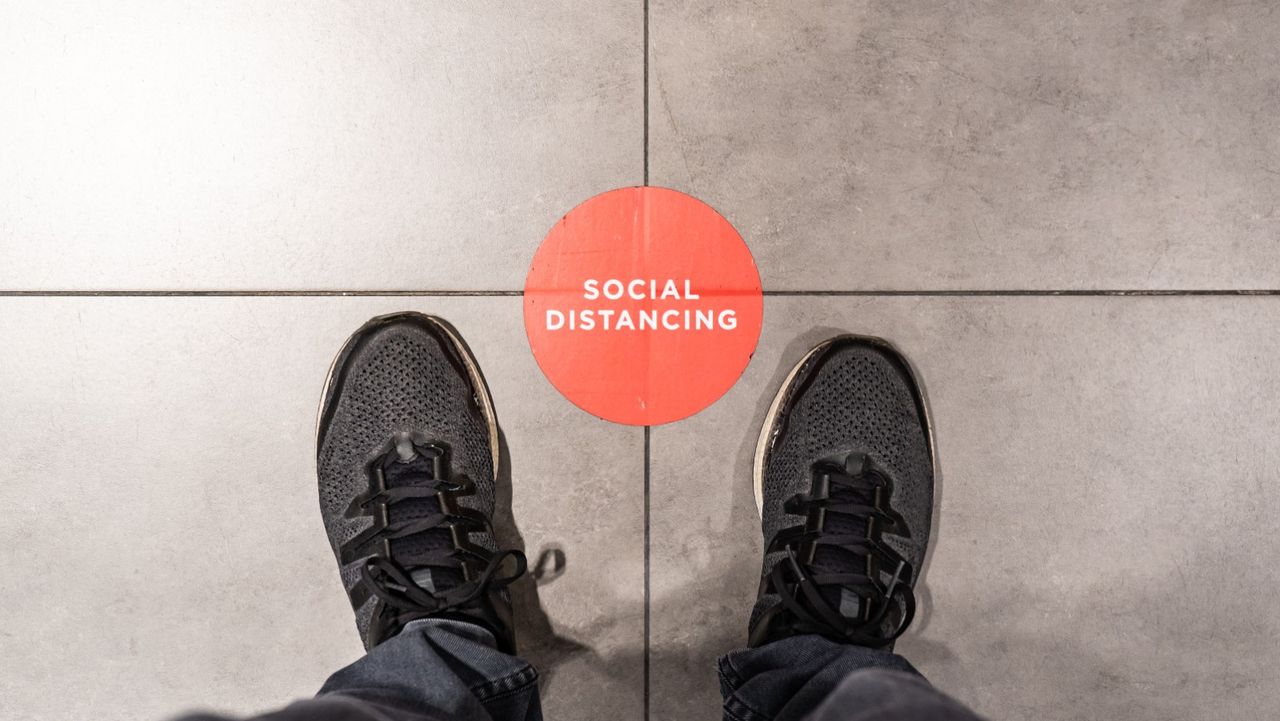Does social distancing 6 feet apart indoors keep you safe? A new study says otherwise
Mask up and stay safe


As the world begins to open back up, simple pleasures like indoor dining and going to the movies finally seem possible. According to a new study by MIT, though, social distancing indoors may not be as safe as we initially thought.
Keeping a 6-foot distance between yourself and others outside is still an effective method in decreasing your chances of contracting COVID-19. Indoors though, is another story.
More from woman&home:
• Can't sleep? Headspace gives three tips on a good night's rest
• No strings sex apps for 40+ women looking for fun without the relationship
• How to create the best bedtime routine and stick to it
MIT researchers are now claiming that the 6-foot rule is based on an outdated understanding regarding how the virus moves in closed spaces. Now, they're claiming that variables, including the number of people in a space, if people are wearing masks, what they are doing, and ventilation levels are far more important.
The study was released online before its print publication in the peer-reviewed journal PNAS. If you want to have better control over indoor exposure levels, then the study suggests doing individual calculations for the targeted space. This is essential because, as one of the author's notes, in some cases, the exposure level could be the same at 6 feet as at 60 feet.
"The distancing isn't helping you that much, and it's also giving you a false sense of security because you're as safe at 6 feet as you are at 60 feet if you're indoors. Everyone in that space is at roughly the same risk, actually," Martin Bazant, a professor in applied mathematics for MIT, told CNBC.
How can you determine the safety of a room?
With the help of John Bush (another MIT professor in applied mathematics), he and Martin developed a formula that estimates how long it would take for a person to hit dangerous levels of exposure from just one infected person entering a room. The calculation takes into account the number of people in the room, the size of the indoor area, what they are doing if masks are worn, and the type of ventilation being used. From there, it will help determine the risk of exposure and if being 6 feet (or father) apart has any impact in preventing the spread of COVID-19.
Sign up for the woman&home newsletter
Sign up to our free daily email for the latest royal and entertainment news, interesting opinion, expert advice on styling and beauty trends, and no-nonsense guides to the health and wellness questions you want answered.
What indoor areas are considered high risk?
As scientists continue studying the virus, new information has replaced what we previously thought. At the beginning of the pandemic, it was thought that the virus traveled through heavier droplets typically caused by sneezing or talking out loud. According to Insider, though, new evidence has shown that the virus is present on lighter aerosol droplets that remain suspended in the air and travel farther.
This means that in calmer environments, the droplets will slowly drift to the ground, according to the study. But, the real danger comes in environments that include a lot of talking, sneezing, singing, and eating. The air droplets are suspended in the air longer and will actually mix around the room, too, increasing your exposure.
If you want to decrease your risk for exposure, filtration and ventilation systems will help get virus particles out of the room.
As researchers continue to develop technology to detect COVID-19, getting vaccinated, staying indoors, and social distancing are the best ways to protect yourself. As countries around the world ramp up vaccine distribution, until you get your additional vaccine dose (depending on which vaccine you get), it's best to take precautions when you leave the house.
Rylee is a U.S. news writer who previously worked for woman&home and My Imperfect Life covering lifestyle, celebrity, and fashion news. Before joining woman&home and My Imperfect Life, Rylee studied journalism at Hofstra University where she explored her interests in world politics and magazine writing. From there, she dabbled in freelance writing covering fashion and beauty e-commerce for outlets such as the TODAY show, American Spa Magazine, First for Women, and Woman’s World.
-
 Want to know how to fake tan your back without bending like a pretzel? Three tanning experts explain
Want to know how to fake tan your back without bending like a pretzel? Three tanning experts explainYou don't need to be a contortionist to tan your own back, you just need these tips
By Jess Beech Published
-
 Brighten even the gloomiest spots in your garden with these 8 shade-loving plants
Brighten even the gloomiest spots in your garden with these 8 shade-loving plantsTry these brilliant plants for shade to make the most of your outdoor space, including flowering shrubs and a type of ornamental grass
By Holly Crossley Published
